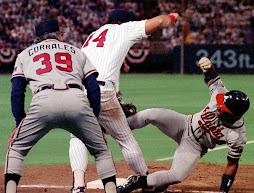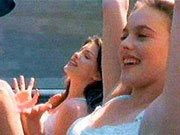In the Tehran of my childhood, John Wayne was a household name. His Hollywood star began to rise over Iran in the late 1950s, but it was in the 1970s—when every weekend we could count on a cowboy show—that “John Vayne” became part of our everyday lives. His renown didn’t derive from his sexy costars or the excellence of his films or even our fascination with the accent. John Wayne came to us dubbed into Farsi, and it was the dub that made the man. He was not so much translated as alchemized by the wizards of Persian dub into a new alloy, a man who walked like a cowboy but talked like a dude from south Tehran.
Wayne’s tough-but-tender talk was delivered in the slang of downtown knife fighters and hero-thugs, an urban subculture known as jahel: men with switchblades and a strict code of honor, not unlike the lonesome heroes of the Wild West. In keeping with jahel tradition, the Iranian Wayne and his gang insulted the honor of parents and family members alike, swore by Ali and Allah, and addressed each other with the most diverse, absurd, and expressive epithets they could find.
Every time an actor turned his back, the dubbers, freed from any obligation to sync with the image, would throw in some slangy insults—corpse washer, stinking vulture—and during gunfights there was always time for jahel philosophizing. Ducking bullets, John Wayne spies a drunk on a porch and mumbles, “Lucky bastard, so totally oblivious to the world.” In Rio Bravo, when Wayne and Dean Martin start at a creaking sound, only to discover a stabled mule, there ensues between the sheriff and his sidekick a barrage of donkey-related swear words. All this with cheery disregard for the script and the authority of its creators.
The art of the Persian dub has an unexpected lineage. When the talkies first came to Iran in the 1930s, distributors continued to treat them like silent movies, interrupting the films with occasional “he said, she said” text panels in Farsi. But literacy was rare, so professional reciters would pace up and down the theater aisles, belting out reductive translations. Another strategy for domesticating foreign cinema was splicing. When a cowboy entered a saloon, for example, the doors swinging in his wake might fade to a popular and sultry singer belly dancing—not to fool viewers into thinking she was a stage act inside the local Texas juke joint, but to mash up that difference. Then the film would wipe seamlessly back to the Western drama of the cheats at the poker table. No one complained about incongruence or bastardization—the downtown audience was quite happy with the pastiche.
We were, it seems, much better at stealing than at imitating. When the three soldiers in Stanley Kubrick’s Paths of Glory are being led out to their execution—a tragic scene of prolonged silence and tension, in the original—the Persian dub has them pleading for their lives, pitifully, comically, in the vernacular of downtown Tehran. They beg to kiss the hands and feet of the colonel, to be his slave, his sacrificial kid. They implore him to “get down from your donkey” and spare their worthless lives. The disjuncture is breathtaking—as if Akira Kurosawa had given Robin Williams a free hand at dubbing Ran into English.
What made the best dubs so good was that they added another register, a meta-commentary that created and revealed subtexts in the films. One classic sequence takes place in The War Wagon, an average film with two big stars, John Wayne and Kirk Douglas, as reluctant partners. Douglas is a slick, dandyish womanizer who’d shoot his mother in the back; he has just left the company of a pair of prostitutes to make a deal with Wayne. Here he is wearing a silk robe with an elaborate Asian dragon stitched on the back while Wayne, who is shaving, appears in a plain full-body undergarment with a holster buckled around his waist. Wayne explains that the gun is always with him because these days, you can’t trust anyone. It’s a throwaway line, obvious and predictable. But then, as Douglas turns to exit, revealing the dragon on his robe, Wayne’s Persian voice offscreen whispers something like, “Well, well, check out the dragon.” Obviously not in the original, it’s a catty under-the-breath comment, a perfect subversion of the manly Hollywood cliché that preceded it.
Then it’s Douglas’ turn. In his own room, he ponders Wayne’s comment about trust. He is pensive and amused, as signaled by the raised eyebrow, the wrinkled forehead, the upturned lip. In the original, he is silent. But in the Persian dub, when Douglas turns and takes off his robe, his voice calls out in self-admiration: “Now that’s what I call a great body.” From these scenes will develop a very strong homoerotic relationship between the two stars and half-outlaws, who in the Persian version address one another as “my love.”
At times there was something uncanny about the dubbing. Often the off-camera voices would seem to issue from a disembodied spectator rather than one of the characters; they said the sorts of things a viewer might say. Some secondary character was always commenting on John Wayne’s height, while a heroine’s sexiness was an occasion for a playful remark. As Dean Martin gets a shave from the delicate, razor-wielding hands of Angie Dickinson, a John Wayne–sounding voice moans, “Oh, I’d die to be hurting like your beard, dude.”
Persian dub died a slow death in the late 1970s with the spread of corporate notions of ownership, stricter enforcement of copyright, and a growing sense of loyalty to the original. The revolution of 1979 hammered in the final unironic nail: Foreign films were banned and unavailable, and the original dubs were locked deep in the archives.
The glory of Persian dub, while it lasted, was that it didn’t hide the artifice of film or its theatrical, scripted element. On the contrary, by showing that the original lines were just as made up as the dubbed ones, it seemed to acknowledge something even more postmodern: that social roles, like acting roles, depend on artifice, and that perhaps all cultural forms develop through acts of mistranslation.
There were a thousand invented lines in every dubbed film, but they weren’t meant to fool anyone. Seeing the Persian dubbers get away with one more aside, one more joke, one more invented aphorism brought us closer to the films in a conspiratorial kind of way. They made them ours.
Wednesday, April 28, 2010
From An Email My Dad Sent Me
Subscribe to:
Post Comments (Atom)










.jpg)

































No comments:
Post a Comment